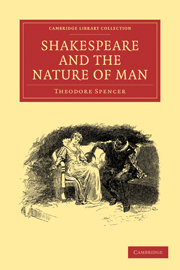Book contents
- Frontmatter
- Preface
- Contents
- SHAKESPEARE and THE NATURE OF MAN
- I Man in Nature: the Optimistic Theory
- II Man in Nature: the Renaissance Conflict
- III The Dramatic Convention and Shakespeare's Early Use of It
- IV Hamlet and Troilus and Cressida
- V Othello and King Lear
- VI Macbeth and Antony and Cleopatra
- VII Shakespeare's Last Plays
- VIII Literature and the Nature of Man
- Index
V - Othello and King Lear
Published online by Cambridge University Press: 07 September 2010
- Frontmatter
- Preface
- Contents
- SHAKESPEARE and THE NATURE OF MAN
- I Man in Nature: the Optimistic Theory
- II Man in Nature: the Renaissance Conflict
- III The Dramatic Convention and Shakespeare's Early Use of It
- IV Hamlet and Troilus and Cressida
- V Othello and King Lear
- VI Macbeth and Antony and Cleopatra
- VII Shakespeare's Last Plays
- VIII Literature and the Nature of Man
- Index
Summary
After Troilus and Cressida, if the chronology of modern scholarship is correct, Shakespeare chose two stories which were poor material for dramatization; they appeared as All's Well that Ends Well, in 1602–03, and Measure for Measure in 1604. About the first there is nothing revealing to be said; with the exception of one or two characters and an occasional scene, it is a dispiriting and tasteless performance. Measure for Measure, though it also is unsatisfactory, is more interesting, for, like Troilus and Cressida, it seems to express the darkening view of man's nature, the consciousness of difference between outward show and inner truth, the growing awareness of the possibilities of interior chaos, which at this time were apparently characteristic of Shakespeare's imagination.
The difference between appearance and reality is clearly illustrated in this play by the character of Angelo. The Duke of Vienna gives him the government of the city, because Angelo seems to be an ideal human being, and his external behavior is apparently the reflection of his inner, admirable and socially minded nature. But such is not the case. The whole city of Vienna is corrupt with lust (some of the best dramatic scenes in the play describe life in a bawdy house), and Angelo proves to be no exception to the general situation; the moment he sees Isabella he wants to possess her, and all his virtue is thrown to the winds:
I have begun:
And now I give my sensual race the rein,
he tells her; and he proposes an infamous bargain: he will free her brother (who is condemned to death for lust), if she will satisfy his lust for her.
- Type
- Chapter
- Information
- Shakespeare and the Nature of Man , pp. 122 - 152Publisher: Cambridge University PressPrint publication year: 2009First published in: 1943

